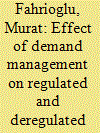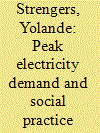|
|
|
Sort Order |
|
|
|
Items / Page
|
|
|
|
|
|
|
| Srl | Item |
| 1 |
ID:
128416


|
|
|
|
|
| Publication |
2014.
|
| Summary/Abstract |
Air-conditioners and antibiotics are two technologies that have both been traditionally framed around individual health and comfort needs, despite aspects of their use contributing to social health problems. The imprudent use of antibiotics is threatening the capacity of the healthcare system internationally. Similarly, in Australia the increasing reliance on air-conditioning to maintain thermal comfort is contributing to rising peak demand and electricity prices, and is placing an inequitable health and financial burden on vulnerable heat-stressed households. This paper analyses policy responses to these problems through the lens of social practice theory. In the health sector, campaigns are attempting to emphasise the social health implications of antibiotic use. In considering this approach in relation to the problem of air-conditioned cooling and how to change the ways in which people keep cool during peak times, our analysis draws on interviews with 80 Australian households. We find that the problem of peak electricity demand may be reduced through attention to the social health implications of air-conditioned cooling on very hot days. We conclude that social practice theory offers a fruitful analytical route for identifying new avenues for research and informing policy responses to emerging health and environmental problems.
|
|
|
|
|
|
|
|
|
|
|
|
|
|
|
|
| 2 |
ID:
099359


|
|
|
|
|
| Publication |
2010.
|
| Summary/Abstract |
International mandates for smart metering are enabling variable and real-time pricing regimes such as dynamic peak pricing (DPP), which charges 10-40 times the off-peak rate for electricity during short periods. This regime aims to reduce peak electricity demand (predominantly due to increase in residential air-conditioning usage) and curb greenhouse gas emissions. Although trials indicate that DPP can achieve significant demand reductions, particularly in summer, little is known about how or why households change their cooling practices in response to this strategy. This paper discusses the outcomes of a small qualitative study assessing the impact of a DPP trial on household cooling practices in the Australian state of New South Wales. The study challenges common assumptions about the necessity of air-conditioning and impact of price signals. It finds that DPP engages households as co-managers of their cooling practices through a series of notification signals (SMS, phone, in-home display, email, etc.). Further, by linking the price signal to air-conditioning, some householders consider this practice discretionary for short periods of time. The paper concludes by warning that policy makers and utilities may serve to legitimise air-conditioning usage and/or negate demand reductions by failing to acknowledge the non-rational dynamics of DPP and household cooling practices.
|
|
|
|
|
|
|
|
|
|
|
|
|
|
|
|
| 3 |
ID:
150804


|
|
|
|
|
| Summary/Abstract |
Our society derives a quantifiable benefit from electric power. In particular, forced outages or blackouts have enormous consequences on society, one of which is loss of economic surplus. The society relies on having a continuous supply of electrical energy. Some customers may willingly risk this continuous supply and participate in demand management programs for electrical power. If the power system grid is in trouble, electric utilities need to have demand relief. Customers willing to reduce their demand to help the system can receive an incentive fee for helping the utilities. Demand relief can be system wide or location specific. Sometimes it can be more effective to fix the electrical demand vs. supply imbalance from the demand side. The value of demand management contracts is greatly affected by customer location. Inclusion of locational attributes into the contract design procedure increases the effectiveness of the contracts by helping a utility get more value from its demand management programs. Independent System Operators and regulators, among others, can also benefit from effective demand management. This paper will investigate how this type of demand management contracts can help the electricity sector both in regulated and deregulated environments.
|
|
|
|
|
|
|
|
|
|
|
|
|
|
|
|
| 4 |
ID:
183037


|
|
|
|
|
| Summary/Abstract |
This paper describes the energy sector related to public lighting systems in Ecuador. It presents, in an orderly and succinct manner, the legal framework that governs this service and its model which includes the following aspects: its current structure, energy supply policies, competencies, tariff and subsidy specifications, service policies, planning, system modernization and related environmental aspects centering on the evolution and new law of the electricity sector. Nowadays, 5.56% of the energy generated in Ecuador is destined to the public lighting service. In 2019, 1382.14 GWh were destined to public lighting. For the next ten years, according to the Electricity Master Plan, an increase of 534,076 new points of light is foreseen. In the short term, there is no defined plan to replace the systems with sodium lights to LED technology lights that will allow not only to accomplish the state energy efficiency policies, but also to reduce the energy consumption. The legal framework and the exposed data allow the different stakeholders to make informed intervention decisions.
|
|
|
|
|
|
|
|
|
|
|
|
|
|
|
|
| 5 |
ID:
112305


|
|
|
|
|
| Publication |
2012.
|
| Summary/Abstract |
Demand managers currently draw on a limited range of psychology and economic theories in order to shift and shed peak electricity demand. These theories place individual consumers and their attitudes, behaviours and choices at the centre of the problem. This paper reframes the issue of peak electricity demand using theories of social practices, contending that the 'problem' is one of transforming, technologically-mediated social practices. It reflects on how this body of theory repositions and refocuses the roles and practices of professions charged with the responsibility and agency for affecting and managing energy demand. The paper identifies three areas where demand managers could refocus their attention: (i) enabling co-management relationships with consumers; (ii) working beyond their siloed roles with a broader range of human and non-human actors; and (iii) promoting new practice 'needs' and expectations. It concludes by critically reflecting on the limited agency attributed to 'change agents' such as demand managers in dominant understandings of change. Instead, the paper proposes the need to identify and establish a new group of change agents who are actively but often unwittingly involved in reconfiguring the elements of problematic peaky practices.
|
|
|
|
|
|
|
|
|
|
|
|
|
|
|
|
| 6 |
ID:
094852


|
|
|
|
|
| Publication |
2010.
|
| Summary/Abstract |
We propose the introduction of an energy-based parallel currency as a means to ease the transition to energy-conscious living. Abundant fossil energy resources mask the internal and external energy costs for casual energy consumers. This situation is challenging communities that draw a significant fraction of their primary energy consumption from renewable energy sources. The Masdar Energy Credit (MEC) system is a way of translating the fundamental aspects behind energy generation and usage into a tangible reality for all users with built-in fungibility to incentivize collectively sustainable behavior. The energy credit currency (ergo) corresponds with a chosen unit of energy so that the total amount of ergos issued equals the energy supply of the community. Ergos are distributed to users (residents, commercial entities, employees, and visitors) on a subscription basis and can be surrendered in exchange for the energy content of a service. A spot market pricing mechanism is introduced to relate ergos to "fiat" currency using a continuously variable exchange rate to prevent depletion of the sustainable energy resource. The MEC system is intended to: (i) meet the sustainable energy balance targets of a community (ii) support peak shaving or load shifting goals, and (iii) raise energy awareness.
|
|
|
|
|
|
|
|
|
|
|
|
|
|
|
|
|
|
|
|
|